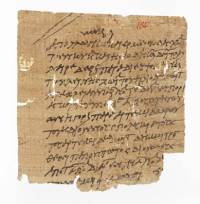Table of Contents
<html>
<a href=“http://lucianofsamosata.info/wiki/doku.php?id=submission_page”><img src=“http://lucianofsamosata.info/images/contact.png” /></a>
</html>
Letter from Heraclitus CV
Letter CV
The Philosopher Heraclitus, to his friend Asphidamas; giving him an account of his current temperment.
I am fallen sick (Aphidamas) of edema. Whatever bristles in us can cause a disease. Excess of heat brings fever; excess of wind, cholic. My particular temperment comes from excess moisture. The soul keeps all of these in due proportion. The best thing we have is health. Nature herself is health. We cannot predict what is contrary to Nature, but it always comes by surprise. I know the nature of the world. I know the nature of man. I know diseases. I know health. I will excuse myself. I will imitate the Gods, who make equal the inequalities of the world, by committing them to the governance of the Sun. Heraclitus shall not die of the indisposition: Rather, by his conduct, he will kill the disease that afflicts him. In the universe most things are dried up and not refrigerated. My wisdom knows most things, but if my body should happen to be overstrained, it must yield and descend to the destined place. My soul however will not do so but being immortal, I will ascend to the aetherial mansions, where I will be sure not to forget to accuse the Ephesians. Then shall I converse not with men, but Gods; and have alters raised to me instead of erecting them to others. There Enthyclea will not be able to accuse me of impiety, but rather him of maliciousness. Men have always wondered why I continually looked sad, but then they did not consider the excessive wickedness of the world. Let them refrain from their ill courses, and then perhaps I may smile. My malady is the less irksome when I am alone, or that it may be because my soul foreseeing she shall shortly get free of this mortal prison, composed of phlegm, choler, prurulent matter, blood, nerves, bones, and flesh, is pleased with the prospects of her native country. For unless there were these dieases, we should never be ambitious of the freedom, which is the perfection of bliss. Farewell.
- Modernized from “A Select Collection of Letters of Antients” by M. Savage from the original Greek
